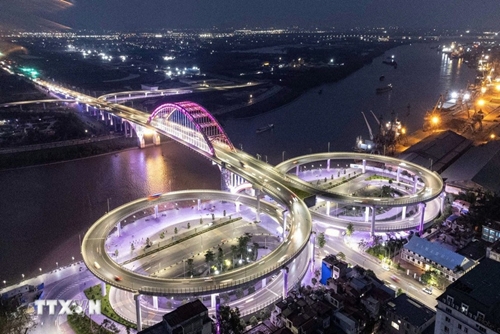Speaking to Vietnam News Agency correspondents in Australia on Vietnam’s 80-year journey of reconstruction, nation-building, defense and development, Prof. Thayer noted that Vietnam’s strategic shift was marked by opening its economy, joining the Association of Southeast Asian Nations (ASEAN), the Asia-Pacific Economic Cooperation (APEC), the World Trade Organization (WTO), and signing multiple free trade agreements.
    |
 |
|
Since 1989, Vietnam has seen tangible results, particularly in reducing poverty through its own efforts and international cooperation. (Photo for illustration) |
Vietnam has become increasingly confident in promoting multilateralism, establishing strategic partnerships, and more recently, comprehensive strategic partnerships, he said.
The expert highlighted Vietnam’s active engagement in international institutions, including two terms as a non-permanent member of the United Nations Security Council. Since publishing its first Defense White Paper in 1998, he said, Vietnam has consistently pursued a defense policy of not participating in military alliances, not affiliating with one country to oppose another, not allowing foreign countries to establish military bases or use the Vietnamese territory to oppose other countries, and not using force or threatening to use force in international relations.
He expressed his admiration for Vietnam’s investment in human resources development, noting the country’s growing pool of highly educated people. Under the leadership of Party General Secretary To Lam, he said, state apparatus are undergoing restructuring to improve efficiency. In diplomacy, Vietnam has built a professional corps and developed a strong global information network through its media agencies such as the Vietnam News Agency (VNA) and the Voice of Vietnam (VOV), while also strengthening foreign language training to enhance international communication.
Prof. Thayer stressed that “Doi Moi” (renewal) was a turning point that truly opened the country to the world. Since 1989, Vietnam has seen tangible results, particularly in reducing poverty through its own efforts and international cooperation. It has also advanced social justice, gender equality, and support for ethnic minorities.
He praised improvements in living standards, citing rising life expectancy, falling unemployment, and Vietnam’s transition into a lower-middle-income country. He added that many Vietnamese students and professionals who study or work abroad are now returning home to contribute to national development.
According to the professor, Vietnam is a dynamic nation pursuing active cultural diplomacy and multilateral engagement, while consistently showing warmth and hospitality. These qualities, he said, have brought tangible benefits, especially to the tourism sector, which has recorded robust growth.
On social welfare, he highlighted government-sponsored pension schemes and a relatively strong healthcare system, calling them major leaps for a developing country.
Concluding the interview, Prof. Thayer recalled President Ho Chi Minh’s principle of self-reliance and friendship with all nations. Over the past 80 years, he said, Vietnam has adhered to this approach and achieved remarkable success, emerging as a constructive and reliable global partner. No longer just an aid recipient, Vietnam has become a provider of assistance, as seen during the COVID-19 pandemic through its pioneering virtual conferences and participation in UN peacekeeping operations.
Looking ahead, he emphasized that amidst global uncertainties and the challenges of digital transformation and climate change, Vietnam must continue to foster resilience and self-reliance to firmly advance into a new era.
Source: VNA